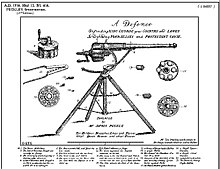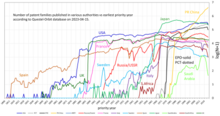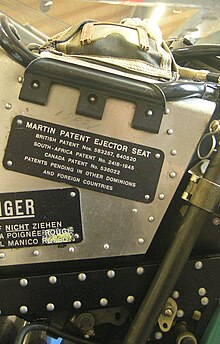Patent
[2] The procedure for granting patents, requirements placed on the patentee, and the extent of the exclusive rights vary widely between countries according to national laws and international agreements.The word patent originates from the Latin patere, which means "to lay open" (i.e., to make available for public inspection).However, recent historical research has suggested that the 1474 Statute was inspired by laws in the Kingdom of Jerusalem that granted monopolies to developers of novel silk-making techniques.[11] Patents were systematically granted in Venice as of 1474, where they issued a decree by which new and inventive devices had to be communicated to the Republic in order to obtain legal protection against potential infringers.[15] After public outcry, King James I of England (VI of Scotland) was forced to revoke all existing monopolies and declare that they were only to be used for "projects of new invention".This was incorporated into the Statute of Monopolies (1624) in which Parliament restricted the Crown's power explicitly so that the King could only issue letters patent to the inventors or introducers of original inventions for a fixed number of years.During the reign of Queen Anne, patent applications were required to supply a complete specification of the principles of operation of the invention for public access.In 1641, Samuel Winslow was granted the first patent in North America by the Massachusetts General Court for a new process for making salt.[21] The first patent under the Act was granted on July 31, 1790, to Samuel Hopkins of Vermont for a method of producing potash (potassium carbonate).[27] The number of patent applications filed each year has been growing for most countries although not smoothly, and jumps in activity are often observed due to changes in local laws.[38][35] Several hypotheses have been proposed as explanations for the observed decline: A patent does not give a right to make or use or sell an invention.[56] A patent is a limited property right the government gives inventors in exchange for their agreement to share details of their inventions with the public.An example of this would be a company paying another party to create a patented product in order to reduce their competitor's market share.Although an infringer is generally free to rely on any available ground of invalidity (such as a prior publication, for example), some countries have sanctions to prevent the same validity questions being relitigated.[69] Applications by artificial intelligence systems, such as DABUS, have been rejected in the US, the UK, and at the European Patent Office on the grounds they are not natural persons.[73] In the United States, the Constitution empowers Congress to make laws to "promote the Progress of Science and useful Arts ...".[74][non-primary source needed] The TRIPS Agreement has been largely successful in providing a forum for nations to agree on an aligned set of patent laws.[83] The treaty, and in particular its planned extension,[80] is seen as complementing the Nagoya Protocol to the Convention on Biological Diversity and its system of Access and Benefit-Sharing.[84] Representatives of Indigenous peoples view the GRATK Treaty as a "first step towards guaranteeing just and transparent access to these resources.A 2023 study by Rochester Institute of Technology found the full term maintenance rate of issued US patents has been fairly constant (40-50%) since 1992.[100] Non-national treatments in national patent offices had been prevalent among the Northern countries[citation needed] until they were prohibited after the negotiation of the Paris Convention for the Protection of Industrial Property.TRIPS Agreement Article 27.1 states that 'patents shall be available and patent rights enjoyable without discrimination as to the place of invention, the field of technology and whether products are imported or locally produced'.Trade secrets are protected by non-disclosure agreement and labour law, each of which prevents information leaks such as breaches of confidentiality and industrial espionage.Compared to patents, the advantages of trade secrets are that the value of a trade secret continues until it is made public,[101] whereas a patent is only in force for a specified time, after which others may freely copy the invention; does not require payment of fees to governmental agencies or filing paperwork;[101] has an immediate effect;[101] and does not require any disclosure of information to the public.Based on these groups, a project named Corporate Invention Board, had measured and analyzed the patent portfolios to produce an original picture[106] of their technological profiles.[113] Legal scholars, economists, activists, policymakers, industries, and trade organizations have held differing views on patents and engaged in contentious debates on the subject.[114]: 262–263 Contemporary criticisms have echoed those arguments, claiming that patents block innovation and waste resources (e.g. with patent-related overheads) that could otherwise be used productively to improve technology.[115][116][117] These and other research findings that patents decreased innovation because of the following mechanisms: Boldrin and Levine conclude "Our preferred policy solution is to abolish patents entirely and to find other legislative instruments, less open to lobbying and rent seeking, to foster innovation when there is clear evidence that laissez-faire undersupplies it.[138] A 2016 paper argued for substantial weakening of patents because current technologies (e.g. 3D printing, cloud computing, synthetic biology, etc.)[138] Debates over the usefulness of patents for their primary objective are part of a larger discourse on intellectual property protection, which also reflects differing perspectives on copyright.






Patent (disambiguation)U.S. Patent and Trademark OfficePatent claimHistoryEconomicsCriticismApplicationProsecutionOppositionValuationInfringementPatentable subject matterInventorshipNoveltyInventive step and non-obviousnessIndustrial applicabilityUtilityPerson skilled in the artPrior artSufficiency of disclosureUnity of inventionPatent Cooperation TreatyAustraliaCanadaEuropeGermanyNetherlandsUnited StatesBiologicalBusiness methodChemicalInsuranceSoftwarePatent analysisPirate PartyGlossaryCapitalismAusterityBusinessBusiness cycleBusinesspersonCapitalCapital accumulationCapital marketsCompanyCorporationCompetitive marketsEconomic interventionismEconomic liberalismEconomic surplusEntrepreneurshipFictitious capitalFinancial marketFree price systemFree marketGoods and servicesInvestorInvisible handVisible handLiberalizationMarginalismPrivate propertyPrivatizationProfitRent seekingSupply and demandSurplus valueWage labourAnglo-SaxonAuthoritarianCorporateDirigistHumanisticLaissez-faireLiberalLibertarianMarketMercantilistMonopolyNationalNeoliberalNordicPrivateRegulated marketRegulatorySocialState-sponsoredWelfareAmericanAustrianChartalismChicagoClassicalInstitutionalKeynesianMarket monetarismCritique of political economyCritique of workMarxistMonetaristNeoclassicalNew institutionalSupply-sideAge of EnlightenmentCapitalism and IslamCommercial RevolutionFeudalismIndustrial RevolutionMercantilismPrimitive accumulationPhysiocracySimple commodity productionAdvancedConsumerCommunityFinanceGlobalIlliberalMerchantProgressiveRentierState monopolyTechnologicalBenthamRicardoMalthus